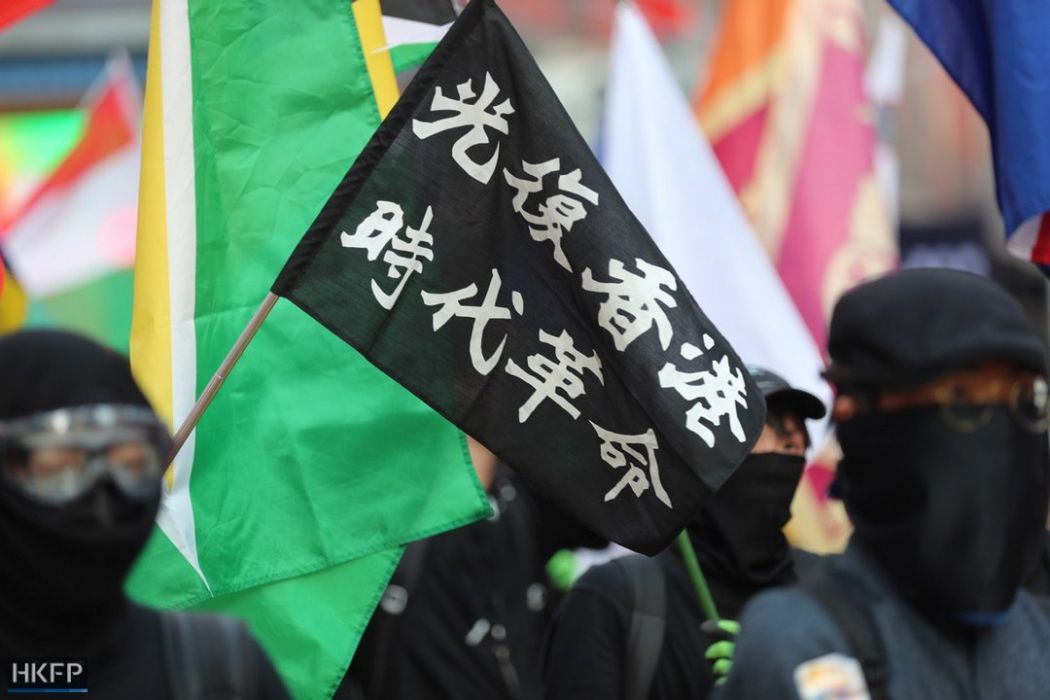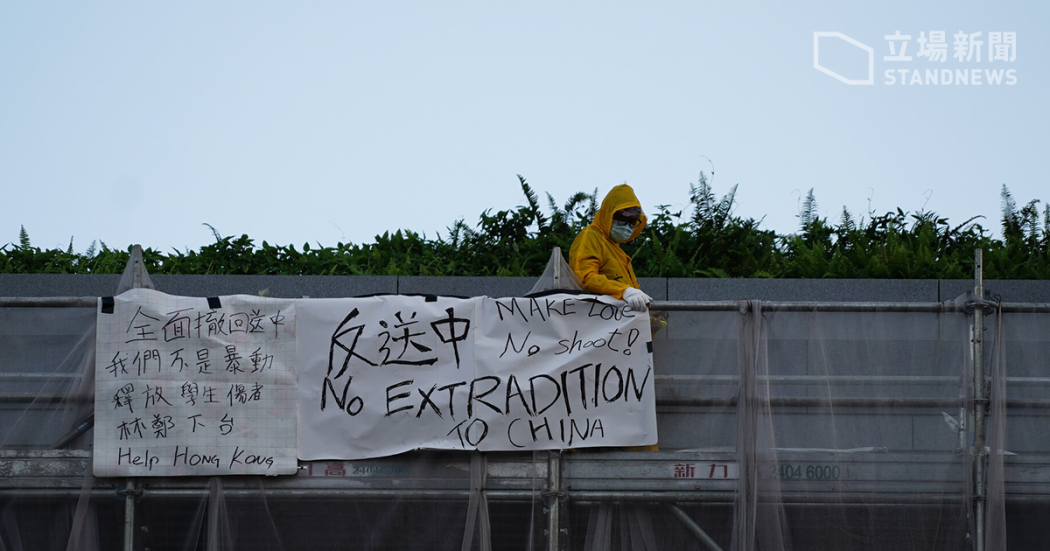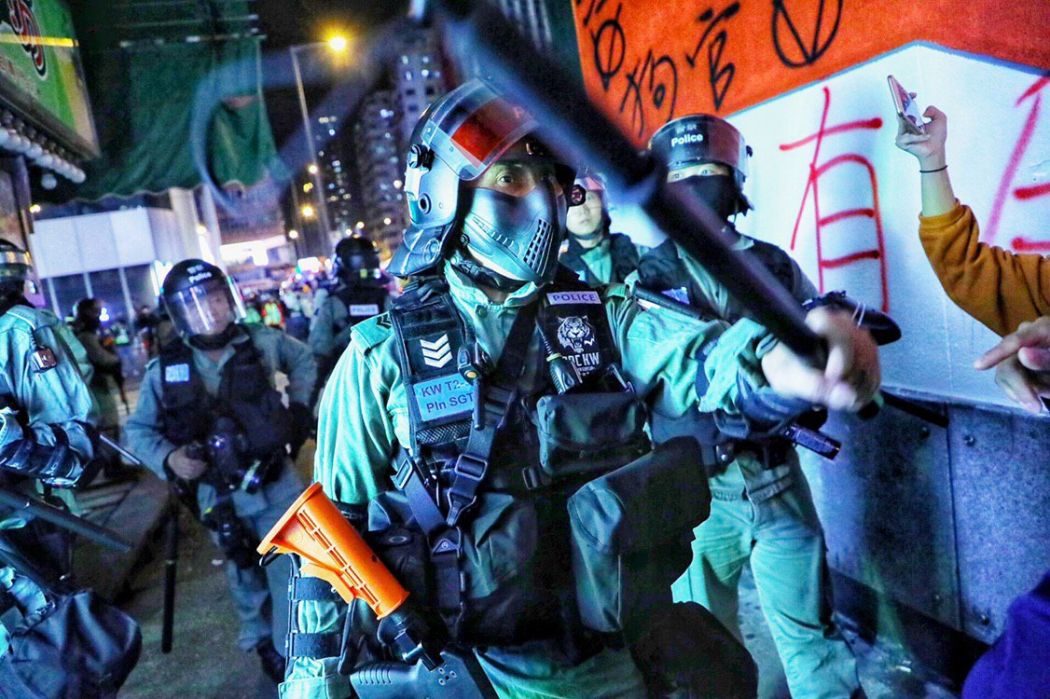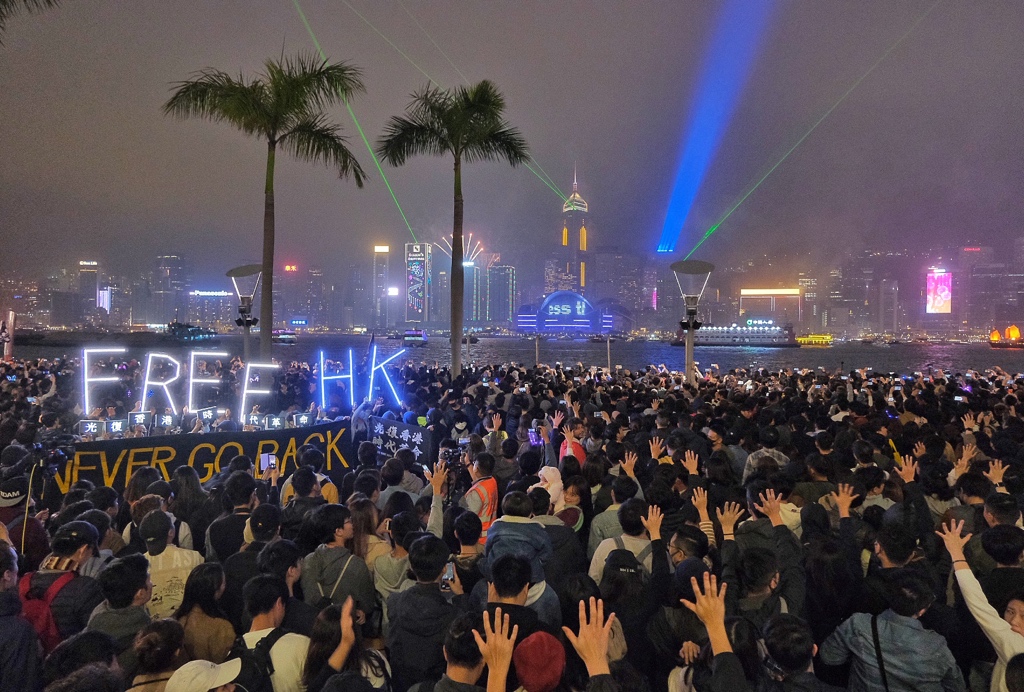What began as a handful of familiar chants against an extradition agreement with China escalated into calls for democratic reform and, eventually, independence. HKFP looks at how a year-long stream of protest slogans evolved to reflect changing protester attitudes.
Liberate Hong Kong, the revolution of our times 光復香港,時代革命
The near-ubiquitous rallying cry “liberate Hong Kong; the revolution of our times” was first coined in 2016 by Hong Kong localist Edward Leung. The 29-year-old activist is currently serving a six-year jail sentence for rioting and assault of a police officer in connection with the Mong Kok unrest. He has since become a figurehead of the movement from behind bars.

Some have identified July 21 last year as a turning point in the popularisation of the slogan, when crowds encircled the China Liaison Office in Sai Wan and pelted eggs at the national emblem. “We did not think of chanting Leung’s slogan… somebody did that and we followed,” a fresh university graduate told HKFP at the time. The night, which saw tear gas and rubber bullets, has often been overshadowed by the mob attack in Yuen Long MTR station. Early interpretations of the phrase included “Reclaim” or “Free Hong Kong.”
Hongkongers, add oil 香港人,加油
A common phrase in Hong Kong and other parts of the Chinese-speaking world, “add oil” is used to express encouragement and loosely translates to “keep it up.”
Last year, it gained traction around the time of the so-called “million-strong” marches against the ill-fated extradition bill, which would have enabled fugitive transfers to the mainland.
No rioters, only tyranny 沒有暴徒,只有暴政
“No rioters, only tyranny” references a charge under a colonial-era law, added in 1970 after the 1967 leftist riots. Criticised as vague and arbitrary, rioting – defined as taking part in an unlawful assembly and committing a “breach of peace” – carries a maximum sentence of ten years in prison.
Then-police chief Stephen Lo came under fire last year after he declared the June 12 clashes outside the Legislative Council (LegCo) – which saw the first firing of tear gas since 2014 – a “riot.” He later backtracked and said only five who threw bricks and used metal rods against officers had committed rioting. Chief Executive Carrie Lam also used the term in a video address shortly after – giving rise to the slogan.
Five demands, not one less
五大訴求,缺一不可
“Five demands, not one less” gained popularity at the end of last June following the death of protester Marco Leung, who fell from a height at Pacific Place in Admiralty on June 15. Sporting a now-symbolic yellow poncho, his protester banner has been credited with forming the basis of the movement’s five demands. It included the withdrawal of the extradition bill, retraction of the “riot” characterisation, release of students and the injured, and Lam’s resignation as chief executive – later replaced with calls for an investigation into police behaviour. The fifth demand for dual universal suffrage – for both LegCo and the chief executive – was also added.
Despite axing the loathed legislative proposal, the government has refused to capitulate to the remaining demands, saying amnesty would contravene the rule of law.

Leung’s death has been connected with the slogan “He was killed by tyranny,” which has also been linked to other protest-related tragedies.
Fight for freedom, stand with Hong Kong
The prevalence of the English-language slogan coincided with a push for greater international support for the city’s pro-democracy movement. Last June, activists raised more than HK$5 million to crowdfund taking out ads in major international newspapers under the banner “Stand with Hong Kong.” The campaign occurred during the G20 summit in Osaka where world leaders from the European Union and 19 countries – including Chinese leader Xi Jinping – convened to discuss pressing economic issues.
Crowds also chanted it whilst pushing the US to pass the Hong Kong Human Rights and Democracy Act, which would require Washington to punish those deemed responsible for rights abuses in the city.
Crowds are also marching west from Central, chanting “Stand with Hong Kong, fight for freedom!” near Lan Kwai Fong’s nightlife district.
— Hong Kong Free Press HKFP (@HongKongFP) August 31, 2019
In full: https://t.co/kmLJLFCnSX. #hongkong #hongkongprotests #antielab pic.twitter.com/pq1PUTyTez
US President Donald Trump signed the bill on November 28 last year.
Black cops, may your whole family die
黑警,死全家
As public anger pivoted towards police over accusations of excessive use of force after the clashes outside the legislature, protesters began to wish death upon officers’ families.
Cordoned-off crowds continue to heckle police inside the shopping mall, shouting “Black cops, may your whole family die.” pic.twitter.com/hooS3xFn8K
— Hong Kong Free Press HKFP (@HongKongFP) May 1, 2020
“Black” alludes to alleged collusion with triads. The claim has been fuelled by the attack on commuters, civilians and journalists at Yuen Long MTR station last July 21 by assailants later confirmed to have triad links. Some accused police of deliberately walking away from the scene and ignoring distress calls. Variations of the slogan reference the death of officers’ paternal and maternal families, as well as their fathers and mothers.
Hong Kong police knowingly break the law
香港警察,知法犯法
“Hong Kong police knowingly break the law” spotlights what protesters see as a lack of accountability among officers accused of committing illegal acts. The birth of the slogan would foreshadow months of conflict between the two sides, despite a 999-page watchdog report that largely cleared police of wrongdoing. Critics have highlighted that the Independent Police Complaints Commission lacks investigative powers and cannot summon witnesses.
Good guys don’t join the police; those who join the police go to hell 好仔唔當差,當差正仆街
With origins around the 1960s, the popular cry of “Good guys don’t join the police; those who join the police go to hell” is largely self-explanatory.

July 21 people disappeared, August 31 beat people to death, October 1 shoot to kill 721 唔見人,831 打死人 ,101 槍殺人
The first section of this chant points to accusations that police walked away from the scene of the Yuen Long mob attack; the second to unfounded rumours that police killed civilians during a protester clearance operation at Prince Edward MTR station on August 31, 2019; the last – which was added later – references the shooting of an unarmed teen protester with live ammunition during a citywide strike on National Day last October 1.
Hongkongers, resist 香港人,反抗
Last October, the chief executive invoked the Emergency Regulations Ordinance to ban face masks in a bid to aid a clampdown on citywide unrest. It came three days after the protester shooting, prompting the replacement of “Hongkongers, add oil” with “Hongkongers, resist.”
Disband the police force, no more delays
解散警隊,刻不容緩
“Disband the police force, no more delays” has been used in various forms in movements against institutional violence across the world. It references calls to reform or rebuild the police force due to the belief that it wields excessive powers and influence. Camden, New Jersey, is among a handful of American cities which have disbanded their local force.
Hongkongers, take revenge 香港人,報仇
Last November, 22-year-old university student Alex Chow Tsz-lok died from injuries he sustained from a fall near a police clearance of a protest.

Unsubstantiated rumours circulated of police involvement, fanning the flames of public anger and sparking calls for Hongkongers to “take revenge.”
Loyalty and duty, nonsense 忠誠勇毅,不知所謂
Shortly after the appointment of Chris Tang as commissioner of police last November, the force changed their motto from “We Serve with Pride and Care” – which had been in place for more than two decades – to “Serving Hong Kong with Honour, Duty and Loyalty.” Demonstrators have mocked the slogan.
Hongkongers, fight 香港人,戰鬥
Following on from “Hongkongers, add oil,” “Hongkongers resist” and “Hongkongers take revenge,” the new phrase “Hongkongers, fight” was seen spray-painted onto a wall at the besieged Hong Kong Polytechnic University last November and heard at protests towards the start of the new year.
Restore Hong Kong to health, the epidemic fight of our times 康復香港,時代抗疫
The deadly coronavirus outbreak arrived in Hong Kong from mainland China – where it was first detected in Hubei province – in January. It gave rise to the play on Leung’s “Liberate Hong Kong, the revolution of our times.”

It is not the first time a government slogan has been satirised. An Information Services Department video last November featuring the phrase “love conquers violence….” prompted protesters to turn it into the chant “Love conquers violence, oppose police violence,” whilst holding the handles of their umbrellas together to make a love heart symbol.
Breaking the law is breaking the law, unless you are police 犯法就係犯法,除非你係警察
The phrase “Breaking the law is breaking the law, unless you are police” carries a similar meaning to “Hong Kong police knowingly break the law.”
Hong Kong independence, the only way out
香港獨立,唯一出路
In a dramatic escalation, crowds began to adopt the contested pro-independence slogan more widely in 2020. Last month, Beijing revealed plans to promulgate legislation to prevent, stop and punish behaviours in Hong Kong that it deems a threat to national security. The law will bypass the local legislature to be inserted into the city’s mini-constitution, criminalising subversion, secession, foreign interference and terrorism.
After briefly being pushed back by a group of police, protesters restart their march along Mong Kok’s main thoroughfare, chanting “Hong Kong independence, the only way out.” pic.twitter.com/N6Zbp3RKMf
— Hong Kong Free Press HKFP (@HongKongFP) May 27, 2020
It is unclear whether uttering the phrase may become illegal upon promulgation, however, the move has alarmed democrats and civil society groups, as such laws have been used broadly to silence and punish dissidents in China.
Hongkongers, build our nation
香港人,建國
“Hongkongers build our nation” replaced “Hongkongers, resist” and “Hongkongers, fight,” likely last month. On May 27, crowds were seen chanting the slogan in Central during a lunchtime protest against the controversial national anthem bill and national security law.
Fight until the last breath
一息尚存,抗爭到底
The cry of “fight until the last breath” picked up around May after Beijing announced its plans for a national security law, though it had been used previously.
One nation, one Hong Kong 民族自強,香港獨立
The revived pro-independence slogan began to ring among protesters around June, alongside “Hong Kong independence, the only way out.”
No justice, no peace
Crowds at a routine shopping mall lunchtime protest – dubbed “lunch with you” – in June were filmed chanting the English slogan, often used in movements around the world protesting at state violence.
This is the first time I’ve heard the popular #BlackLivesMatter chant “no justice, no peace” at the #HongKongProtests pic.twitter.com/6L5QIO8o1M
— Laurel Chor (@laurelchor) June 12, 2020
“No justice, no peace” has often been used in US movements against state violence against racial groups and, more recently, during the Black Lives Matter movement.
